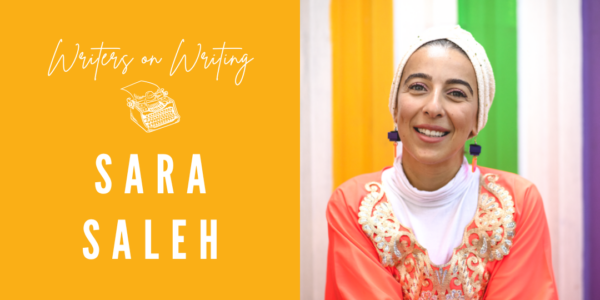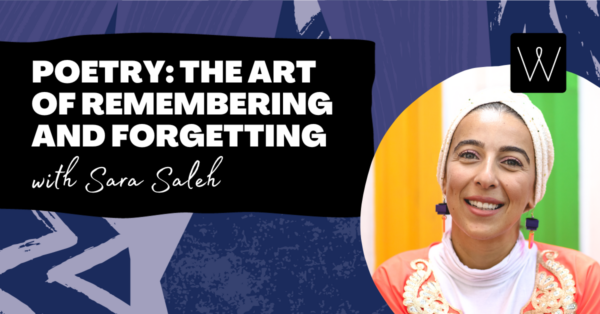
Writers on Writing is our regular conversation with a writer or industry professional about the writing craft, industry insights, and their own practice. This week, we spoke to poet and author Sara Saleh about the significance of memory and loss in poetry, ahead of her workshop The Archive of Remembering and Forgetting.
Congratulations on releasing your first novel AND your first full-length poetry collection within a few months of each other last year. How important was memory and loss in shaping those works?
Thank you, I am immensely proud of both these works, they are out free in the world… although it would be remiss of me not to mention that everything going on in Gaza at the moment is where my focus has been and will remain.
Memory and loss are central themes to both works. The complexities, the non linear and fractured ways in which we often meet memory and loss are intimately explored, and the relationship between them is paradoxical – sometimes an imposition on the writing, other times a landscape to interrogate important political and historical events… And of course, these themes are more pertinent than ever for me.
You’ve previously said in an interview with Cordite: “Poetry requires intimacy and vulnerability, this is necessary but perhaps awkward for some.” How can writers push past the discomfort of writing about personal topics?
(Re)visiting the intention behind writing, and writing that specific piece of work. I tell myself to forget about the potential audience/publication for a moment, and remember ultimately I write first and foremost for myself – then I find it becomes easier to let go, to let myself loose and see where that boldness and vulnerability takes me. The poem knows when you are holding back.
How can the study of different poetic forms build skills that allow us to authentically express ourselves poetically?
The form helps us refine the message (and sometimes, the message will help dictate the form)… and the better we are at grasping that, the stronger a tool we have to excavate and go deeper within ourselves to make and create better poetry. It takes discipline, practice, and a lot of reading… we are readers before we are writers.
What is the greatest misconception people have about writing poetry?
That there is only one way, or one ‘right’ way, to be ‘a poet’, often associated with Eurocentric curricula that centre old, passed white men and overlook the rich oral traditions of peoples from around the world. As an Arab woman, I come from a heritage that reveres and celebrates the poet and poetry more than just as an art form, but as positions that held religious and political significance, too (the holy Quran being testament to this, too, a literary miracle). In Arabic, the word for poetry is شعر.
Taking the root, those 3 letters, it also means to feel, to understand, to know or sense while being aware of this sense of knowing. And for me, that’s the point that shows poetry is for the people. Always has been. And as a perennial student, always curious and learning, it’s an immense privilege to explore / honour and learn from diverse traditions.
Which poets have you been reading or listening to lately that you’d recommend?
Without a doubt, Gawimarra: Gathering, the latest offering from Wiradjuri poet Jeanine Leane.
Sara M Saleh is a human rights lawyer, community organiser, writer, and the daughter of migrants from Palestine, Egypt, and Lebanon, living on Gadigal land. Her poems and short stories have been published in English and Arabic in various national and international outlets and anthologies including Australian Poetry Journal, Cordite Poetry Review, Meanjin, Overland Journal, and Rabbit Poetry. She is co-editor of the groundbreaking 2019 anthology Arab, Australian, Other: Stories on Race and Identity. Sara is the first poet to win both the Australian Book Review’s 2021 Peter Porter Poetry Prize and the Overland Judith Wright Poetry Prize 2020. In one year she released her debut novel, Songs for the Dead and the Living (Affirm Press 2023), and a full-length poetry collection, The Flirtation of Girls (UQP 2023).

If you want to be the first to read great advice, prompts and inspiration from our incredible tutors, subscribe to our weekly e-newsletter Newsbite.
More from Writing NSW
Check out our full range of writing courses in Sydney, our online writing courses and our feedback programs to see how we can help you on your creative writing journey. Find out about our grants and prizes, as well as writing groups across NSW, and sign up to our weekly newsletter for writing events, opportunities and giveaways.
